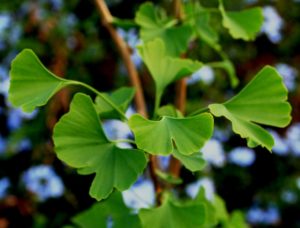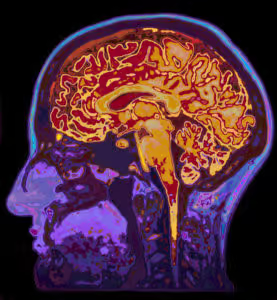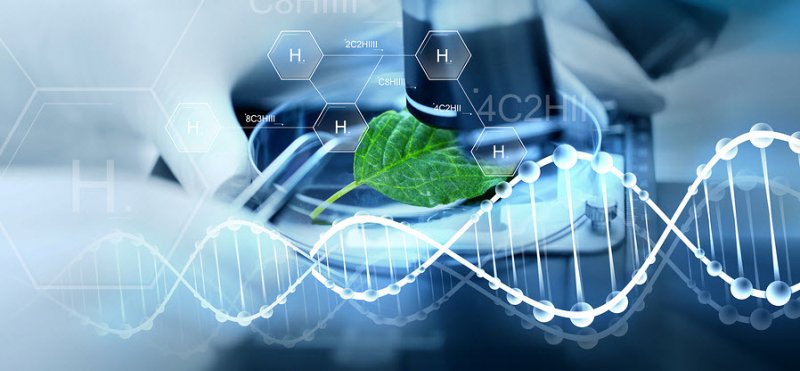Table of Contents
Ginkgo biloba (Ginkgo or Maidenhair) is one of the oldest species of trees on earth. Scientists consider it a “living fossil” dating back 270 million years.[i] It has continued to survive even after major extinction events.
Ginkgo trees can grow to 130 feet (39.6 meters). Some Ginkgo trees in China are thought to be over 2,500 years old. And a 3,000-year-old tree reportedly stands in the Chinese province of Shandong.
Four Ginkgo trees survived the atomic explosion in Hiroshima. Only 1,130 meters from the bombs epicenter.
Ginkgo biloba has been used for medicine in China for several millennia. In the oldest Chinese Materia Medica (2800 B.C.), Ginkgo biloba was recommended for asthma, swelling of the hands and feet, coughs, vascular disorders, aging and for the brain.[ii]
An extract of Ginkgo leaves called EGb 761 is standardized to 24% flavone glycosides (flavonoids) and 6% terpenes (ginkgolides and bilobalides).
This Ginkgo extract regulates neurotransmitters, protects from brain cell degeneration, increases blood vessel microcirculation (blood flow in the smallest of blood vessels). And has antioxidant activity.[iii]
Ginkgo biloba helps:
- Neurotransmitters. Ginkgo Biloba can increase dopamine in the brain. Ginkgo acts as a monoamine oxidase inhibitor (MAOI) which reduces levels of monoamine oxidase (MAO) in the brain. MAO breaks down dopamine.[iv] One of the benefits of boosting dopamine is to reduce anxiety.[v] And to treat ADHD.[vi]
- Cerebral Circulation. Ginkgo biloba increases cerebral blood flow. Improving oxygen and glucose availability to neurons for neuronal health. Improving memory, recall, cognition and learning.[vii] [viii]
- Neuroprotection. Ginkgo Biloba helps boost cerebral blood flow, reduces oxidative stress by eliminating free radicals, and increases nitric oxide which dilates blood vessels.[ix]
What is Ginkgo Biloba?
Ginkgo Biloba (Ginkgo or Maidenhair) is one of the oldest species of trees on earth. This “living fossil” has survived major extinction events for as long as 270 million years.
Ginkgo, also known as Maidenhair, has been used in Chinese medicine for millennia. Many of Ginkgo’s modern applications are based on research by German and Chinese scientists where it is a prescription drug.

The leaves have been used for thousands of years to boost mental alertness, improve cerebral circulation, and overall brain function.
As a nootropic, Ginkgo has been shown to be particularly effective in elderly memory loss, slow thinking and reasoning, and tinnitus. One study shows significant improvement in Parkinson’s and Alzheimer’s patients.[x]
EGb 761 is the standard extract of the Ginkgo referred to in the studies and clinical trials referred to in this article. It is standardized to 24% flavone glycosides (flavonoids) and 6% terpenes (ginkgolides and bilobalides).
How does Ginkgo Biloba work in the Brain?
Ginkgo Biloba boosts brain health and function in several ways. But two in particular stand out.
- Cerebral circulation. Ginkgo boosts several brain functions by improving blood circulation in the brain.
A study in the Department of Radiology, at Johns Hopkins University School of Medicine used MRI’s to measure blood flow in 9 healthy men. MRI’s were done before and after the men took Ginkgo Biloba Extract 60 mg twice a day for 4 weeks.
The study concluded that overall, all regions of the subject’s brains showed a significant change in cerebral blood flow after using Ginkgo.[xi]
- Cognition and mental performance. Ginkgo is well known as a memory booster in the nootropics community. Studies have shown Ginkgo helps attention, mood and processing speed.
One large study at Liberty University, Lynchburg, Virginia was conducted with 262 healthy adults. This 6-week, double-blind, placebo-controlled trial had volunteers taking 180 mg of Ginkgo biloba extract, or a placebo daily for 6 weeks.
The subjects were put through several standardized tests. At the end of the 6-week trial, those using Ginkgo showed significant improvement in verbal and visual recall and memory.[xii]
How things go bad
As we get older, our brain chemistry and energy metabolism changes. Blood vessels in our brain shrink and get narrower. Preventing the free flow of oxygenated blood to neurons. Toxic waste and free radicals accumulate within brain cells.
↓ Memory, recall, reaction time and mood diminish
↓ Critical neurotransmitters decline
↓ Chronic stress reduces memory capacity
All of these age-related changes are contributing factors to the neurodegenerative diseases of aging, including Alzheimer’s and dementia.
But even if you’re not concerned with the effects of aging, Ginkgo biloba can help.
Ginkgo Biloba benefits
Research from hundreds of studies have shown that Ginkgo biloba will:
- Improve memory and cognition[xiii]
- Increase reaction time
- Restore the availability of dopamine and other neurotransmitters
- Improve cerebral blood flow
- Reduce stress[xiv]
- Boost mood
- Help repair brain cells
- Act as an antioxidant to eliminate free radicals
How does Ginkgo Biloba feel?
Ginkgo improves circulation including in the brain. Thinking, reaction time, energy, and memory should improve. Cold hands and feet are often an indication of poor circulation and Ginkgo could help.
Ginkgo has a reputation for helping reduce the symptoms of tinnitus. And it’s also developed a good rep for helping erectile dysfunction (ED) in men.
Many neurohackers report it takes several weeks of continued use of Ginkgo to experience all the benefits this healing herb provides.
Ginkgo Biloba Clinical Research
Age-related cognitive decline is expected as a normal part of aging in our society. This decline can lead to difficulty performing everyday activities like concentrating on what your loved one is saying. Or remembering to attend a family function you’ve been looking forward to for months.
This decline will affect your quality of life and affect your mood. And it’s happening to younger and younger people. But many of us in the nootropics community refuse to accept cognitive decline as “standard”.
Note: One important consideration we found in the research on Ginkgo Biloba. Some of the findings have been contradictory. Some indicating that Ginkgo does not work.
But the overwhelming impression we got from looking at decades of research was that Ginkgo Biloba takes a while to work. Often it can take many months of supplementation to see results. And extracts work far better than plain, powdered, ground Ginkgo.
Ginkgo Biloba Improves Cognition
Researchers in Germany set out to study the effects of Ginkgo Biloba in healthy adults. This randomized, double-blind, placebo-controlled trial worked with 66 health volunteers for 4-weeks. One group was given a placebo, and the other group took 240 mg of Ginkgo Biloba extract daily.
At the end of the trial, those taking Ginkgo Biloba extract saw significant improvements in their “self-perceived” mental health and quality of life. They performed far better on action and reaction tests. And reported a significant improvement in mood compared to those in the placebo group.[xv]
Ginkgo Biloba Improves Quality of Life
Another study with 1,570 men and women in England took either no dietary supplement or 120 mg of Ginkgo Biloba extract daily for 4, 6, or 10 months.
Participants who took Ginkgo extract experienced improvement in activities of daily living, mood and alertness compared to the control (who took nothing).
 Activities of daily living included multi-tasking, completing household tasks, concentrating during a conversation, remembering important dates, and giving and following directions.
Activities of daily living included multi-tasking, completing household tasks, concentrating during a conversation, remembering important dates, and giving and following directions.
Measures of their mood included ratings of anxiety, depression, energy, drowsiness, sadness and happiness. Alertness factor rated whether they felt alert, clumsy, dizzy, relaxed and tired.
Participants in this study who took Ginkgo Biloba extract the longest reported the greatest improvement in all ratings measured. 10 continuous months of supplementing with Ginkgo extract was more effective than 4 months. Their life improved even more the longer they took Ginkgo Biloba extract.[xvi]
Ginkgo Biloba Improves Attention and Memory
Researchers at the University of Northumbria in the UK set out to determine if a single dose of Ginkgo would improve attention and memory in healthy volunteers. This placebo-controlled, multi-dose, double-blind trial worked with 20 people.
Participants were given either a placebo or single-dose of Ginkgo Biloba extract of 120, 240 or 360 mg. They were tested for their speed of attention, attention accuracy, memory speed and quality of memory. They were tested before the dose or placebo, and again at hours 1, 2.5, 4, and 6 hours.
The scientists reported that Ginkgo improved multiple cognitive performance measures. Most dramatic were with “speed of attention”. And results were better with the highest dose of 360 mg compared to the 240 mg dose.
This improvement was noted at the 2.5-hour mark. But was still noticeable 6 hours after supplementing with Ginkgo.
The researchers concluded that Ginkgo dosing can produce “sustained improvement in attention in healthy young volunteers”.[xvii]
Ginkgo Biloba Recommended Dosage
Recommended dose of Ginkgo Biloba is 40 mg 3-times per day. But daily dosage can range from 120 – 600 mg depending on the disorder being treated.
Most Ginkgo biloba products claim that a minimum of 4 weeks is required to achieve a boost in focus, memory and concentration.
Ginkgo Biloba Side Effects
There is the potential for an increased risk of bleeding when Ginkgo biloba is used concurrently with antiplatelet agents (e.g., aspirin, clopidogrel (Plavix®)), anticoagulants (e.g., warfarin (Coumadin®), enoxaparin (Lovenox®), heparin) or herbs with coumarin constituents (e.g., angelica, anise, capsicum, celery, chamomile, clove, danshen, garlic, ginger, horseradish, licorice, onion, papain, red clover).
Hypomania has been reported in patients with depression when Ginkgo leaf extract was used in combination with fluoxetine (Prozac®)/buspirone (BuSpar®), St. John’s wort, and melatonin.
Ginkgo leaf extract can alter insulin secretion. So patients taking insulin should monitor glucose levels closely.
There have also been reports of seizures associated with Ginkgo use with patients using medication used to lower seizure threshold. These drugs include propofol (Diprivan®), mexiletine (Mexitil®), amphotericin B (Fungizone®), penicillins, cephalosporins, imipenem/cilastatin (Primaxin®), bupropion (Wellbutrin®), cyclosporine (Neoral®), fentanyl (Sublimaze®), methylphenidate, and theophylline.
Ginkgo should be used with caution during pregnancy, due to the potential for increased bleeding risk. Ginkgo should be avoided during breastfeeding, due to a lack of sufficient data.
Types of Ginkgo Biloba to buy
Ginkgo leaf is produced from green, picked leaves grown on plantations specifically developed for pharmaceutical purposes.
Ginkgo biloba extract is available in capsules, tablets, concentrated liquids, sublingual sprays, bars and cola drinks.
Standardized products should contain at least 24% flavone glycosides and 6% terpenes (ginkgolides and bilobalides). The products most commonly used in clinical trials are Ginkgo biloba standardized extracts EGb 761 (Tanakan) and LI 1370 (Lichewer Pharma).
Nootropics Expert Recommendation
Ginkgo Biloba extract up to 120 – 240 mg per day
 I recommend using Ginkgo Biloba as a nootropic supplement.
I recommend using Ginkgo Biloba as a nootropic supplement.
Your body does not make Ginkgo biloba on its own. So you must take it as a standardized supplement.
Ginkgo biloba that has not been standardized to at least 24% flavone glycosides and 6% terpenes does not appear to be effective. So make sure you buy a standardized Ginkgo supplement.
Ginkgo increases alertness, focus, concentration and memory even in the young and healthy. Many neurohackers report immediate effects of supplementing with Ginkgo. But others find they need several weeks for the active compounds found in Ginkgo to take effect.
We suggest dosing up to 240 mg per day split into 3 doses throughout your day. But please refer to the “Side Effects” section of this article before you start using Ginkgo. It’s a powerful supplement and could interact with some medications.








Join The Discussion - 162 comments
Matheus
March 31, 2022
Hi David, this is my first comment on your site, so let me say off the bat that you are a tremendous resource.
My questions is this, if there a multiple brands selling ginkgo biloba that falsely claim they are 24/7, how is the consumer supposed to know which ones are trustworthy. I understand that certain brands are known to be more reliable than others, but I’m just getting started in this space and would appreciate being pointed in the right direction. I’m also looking into (again just recently) other starter nootropics such as rhodiola rosea, choline. alpha gpc, and lions mane. I’m assuming that there are general rules of thumb that are useful to know in terms of determining a brands legitimacy. Any advice would be greatly appreciated!
David Tomen
April 1, 2022
Matheus, this article should help and finding high quality supplements: https://nootropicsexpert.com/7-tips-for-choosing-the-highest-quality-nootropic-supplements/
Matheus
April 7, 2022
Thanks, good material. I’ve found many to recommend nootropics depot, and there are many reviews and testimonies to support it. However, just in my first bout of research on the website itself, I find that their ginkgo mention nothing of being “standardized to at least 24% flavone glycosides and 6% terpenes.” Is this an issue? And do you think nootropics depot is a good website?
David Tomen
April 8, 2022
Mattheus, I do not know the folk at Nootropics Depot or the quality of their products. I suggest you contact them and ask for a Certificate of Analysis for that Ginkgo product. And ask them if it is an extract or raw herb.
Chris
March 4, 2022
David,
Could you comment on the impact (positive/negative etc.) of ginko biloba on kidneys? Could you point to some sources as well?
Regards,
David Tomen
March 4, 2022
Chris, there are no human studies that I know of about kidneys and Ginkgo Biloba. But there are plenty of animal studies showing the benefits of using Ginkgo Biloba for protecting and healing the kidneys. You’ll find some links to references in this study: https://www.ncbi.nlm.nih.gov/labs/pmc/articles/PMC4818073/
But like with any supplement if you are dealing with kidney disease you need to keep a close eye on your labs. And using anything in excess can cause kidney and liver problems.
Xavier
February 24, 2022
Hi David, I have been diagnosed with ADHD (Inattentive type)and have been experimenting with Ginkgo for some time now in place of Methylphenidate as I was not enjoying the side effects of Methylphenidate. However I am now taking a dose of Ginkgo 120mg, three time per day (In total, 360mg’s). This dosage allows me to feel the full benefits in terms of being awake and focused. I was wondering if you had any thoughts on the higher dose range for Ginkgo and if it’s safe?
David Tomen
February 24, 2022
Xavier, up to 600 mg per day of Ginkgo Biloba seems to be safe. If in doubt just keep an eye on your kidney and liver numbers the next time you get your labs done.
Xavier
February 24, 2022
Awesome thankyou so much for the response! Becoming a big fan of your YouTube channel and website as a resource for nootropics.
Sandra
February 14, 2022
Hi David! I started to suplement with L-Tryptophan 500mg daily before sleep but after a week I felt VERY depressed with anxiety and lack of motivation to anything. After that I decided to stop increasing my serotonin. I already use acetylcholinesterase inhibibitor in ashwagandha form and also want to try MAOI in form of gingko Biloba, does it boost serotonin much? Or it is countered by higher dopamine ammount
David Tomen
February 14, 2022
Sandra, it sounds like you are low in dopamine. Serotonin and dopamine must be in balance. And if you were dopamine deficient to start then L-Tryptophan pushed you over the edge and that is what you experienced.
The easiest way to counter this is 500 mg L-Tryptophan before bed and during the day 500 g L-Tyrosine twice per day (morning and noon).
Borys
January 26, 2022
Hi David! I’m not diagnosed with ADD altough I feel great after using amantadine (which helped me to fight covid this year) I’ve read that amandtadine work as dopamine reuptake inhibitor, the same mechanism as in other stimulants like modafinil, aderall and Ritalin right?
My second question would be: Is there any OTC suplements which act as dopamine reuptake inhibitor? I already use l-tyrosine 500mg x3 + other suplements to support dopamine, but for some reason dopamine reuptake inhibiton makes me more motivated and energetic.
Thank you for everything David!
David Tomen
January 26, 2022
Borys, Amantadine inhibits NMDA receptors, helps release dopamine and dopamine reuptake which is a little different than ADHD stimulants.
Saffron and Rhodiola Rosea are both dopamine reuptake inhibitors.
Kathy
November 28, 2021
I just bought the Perika SJW and have taken it for a couple of days. I just saw under your listing for Gingko that it is contraindicated with SJW. Should i completely stop the SJW or could I just try it for a while and see how it goes?
Thanks for your advice.
David Tomen
November 29, 2021
Kathy, my complete statement was “Hypomania has been reported in patients with depression when Ginkgo leaf extract was used in combination with fluoxetine (Prozac®)/buspirone (BuSpar®), St. John’s wort, and melatonin.”
If you are not using that combo you should be fine.
Walter
September 21, 2021
Hello David. My question is, i am planning to add ginkgo to my following nootropic stack;
Rhodiola Rosea + Piracetam.
This both works very well for me. But Rhodiola is also MAOI and Piracetam also boosts blood flow to the brain too. What do you think of adding ginkgo to this stack?
David Tomen
September 21, 2021
Walker, Ginkgo should work fine with the other supplements you are using. But you should also be using Alpha GPC or CDP-Choline with Piracetam. You will get far more benefit from using it if you do.
Chris Drennen
August 17, 2021
I am assuming that the risk involved with Ginko and Wellbutrin is very small. I do not have seizures and I don’t take the pill for that reason.
David Tomen
August 18, 2021
Chris, there may be a contraindication because Gingko acts like an MAOI. And Wellbutrin also affects the catecholamines. Just be careful when testing this because you may end up with results you do not like.
Chris Drennen
August 19, 2021
Yes, I was thinking of quitting the Welbutrin anyway. Presciption antidepressants never really had any appreciable effect on me, and never prevented me from getting depressed. I am technically diagnosed with bipolar disorder (although I never fully subscibed to the psychiatric reasoning behind all that), and I do already take Lamictal (anti-seizure drug also used a mood stabilizer) and Seroquel (an antipsychotic also used for bipolar). From what I have read, these 2 do not have any major contraindications with the nootropics. But the antidepressants do, apparently. So I doubt there will be any problem replacing them with the various supplements I’m taking. Besides, I have already experimented from time to time going without the antidrpressants, and I found that there was hardly any noticeable difference.
David Tomen
August 20, 2021
Chris, bipolar disorder comes up every once in a while when I’m researching these supplements. Most of the time it’s a warning that if you are bipolar not to use a particular supplement. So read these reviews carefully including the “Side Effects” section so you don’t get yourself into trouble.
Chris Drennen
August 20, 2021
Just wanted to add: Seroquel apparently acts as a nuerotansmitter receptor antagonist. I tried to read the wikipedia article, but it is highly technical:
“…quetiapine is a dopamine, serotonin, and adrenergic antagonist, and a potent antihistamine with some anticholinergic properties. Quetiapine binds strongly to serotonin receptors; the drug acts as partial agonist at 5-HT1A receptors. …Some of the antagonized receptors (serotonin, norepinephrine) are actually autoreceptors whose blockade tends to increase the release of neurotransmitters.”
It would appear from these descriptions that the drug has the potential to wreak havoc on all your neurotransmitters, especially in combination with nootropics. But it may not be the case. I cannot find any major contraindications anywhere in the literature, besides the fact that the doctors have had me taking it in combination with all sorts of other things.
For years, I have mainly taken it to sleep, and now I cannot sleep without it. It does help to put a damper on any sort of mental anguish and torment assciated with depression and/or anxiety. The effect is essentially sedating.
I’m sure what I am asking you. I know I need to be very carefull with all this stuff. My goal has been to get off Rx psychotropics as much as possible. I have been able to get off Trileptal, Lexapro and Wellbutrin. So that is a good thing. Do you kinow anything else about Seroquel that I ought to be aware of? I have already been able to cut my dose in half. Still trying to work all this out…
Thanks agian for all your help.
David Tomen
August 23, 2021
Chris, this is a list of all the meds and some supplements that are contraindicated with quetiapine: https://www.drugs.com/drug-interactions/quetiapine-index.html
You will find that if this drug acts as an antagonist on dopamine, serotonin and norepinephrine receptors then any supplement that you try that affects any of those receptors will not provide you the full or any benefit. Because Seroquel is blocking it from doing so.
It is highly contraindicated with anything that sedates you. St. John’s wort comes to mind. I’m sure there are a few others but they are primarily concerned with meds that are sedating and not most nootropic supplements.
Chris Drennen
August 19, 2021
Is Ginkgo contraindicated with any of the other nootropics that you know of?
David Tomen
August 20, 2021
Chris, Ginkgo Biloba acts like an MAOI and you’ll see a list of drugs and natural supplement up above under the “Side Effects” section of this review that it is contraindicated with. I’m sure there are more. One that comes to mind that is not on that list is St. John’s wort.
What other supplements did you have in mind?
Chris Drennen
August 20, 2021
Rhodiola comes to mind, as it also acts as a MAOI.
David Tomen
August 23, 2021
You are correct.